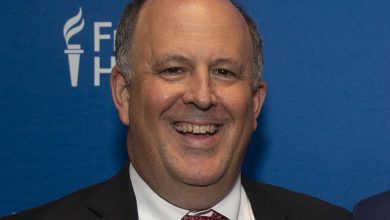Anonymity No More? Age Checks Come to the Web.

Richard Errington clicked to stream a science-fiction film from his home in Britain last month when YouTube carded him.
The site said Mr. Errington, who is over 50, needed to prove he was old enough to watch “Space Is the Place,” a 1974 movie starring the jazz musician Sun Ra. He had three options: Enter his credit card information, upload a photo identification like a passport or skip the video.
“I decided that it wasn’t worth the stress,” he said.
In response to mounting pressure from activists, parents and regulators who believe tech companies haven’t done enough to protect children online, businesses and governments around the globe are placing major parts of the internet behind stricter digital age checks.
People in Japan must provide a document proving their age to use the dating app Tinder. The popular game Roblox requires players to upload a form of government identification — and a selfie to prove the ID belongs to them — if they want access to a voice chat feature. Laws in Germany and France require pornography websites to check visitors’ ages.
The changes, which have picked up speed over the last two years, could upend one of the internet’s central traits: the ability to remain anonymous. Since the days of dial-up modems and AOL chat rooms, people could traverse huge swaths of the web without divulging any personal details. Many people created an online persona entirely separate from their offline one.
But the experience of consuming content and communicating online is increasingly less like an anonymous public square and more like going to the bank, with measures to prove that you are who you say you are. This month, lawmakers in Washington, which has lagged other world capitals in regulating tech companies, called for new rules to protect young people after a former Facebook employee said the company knew its products harmed some teenagers. They repeated those calls on Tuesday in a hearing with executives from YouTube, TikTok and the parent company of Snapchat.
Critics of the age checks say that in the name of keeping people safe, they could endanger user privacy, dampen free expression and hurt communities that benefit from anonymity online. Authoritarian governments have used protecting children as an argument for limiting online speech: China barred websites this summer from ranking celebrities by popularity as part of a larger crackdown on what it says are the pernicious effects of celebrity culture on young people.
“Are we going to start seeing more age verification? Of course,” said Hany Farid, a professor of engineering and computer scienceat the University of California, Berkeley, who has called for more child safety measures. “Because there is more pressure, there’s more awareness now, on how these technologies are harming kids.”
But, Mr. Farid said, regulators and companies need to proceed with caution. “We don’t want the solution to be more harmful than the problem,” he said.
Many websites have long required visitors to submit their birth date to see content meant only for adults. But visitors could usually do so without showing any evidence of their age.
That is no longer enough for some regulators. New child-protection guidelines in Britain say some websites need to take additional steps to verify their users’ ages when the services collect sensitive user data.
An update to the European Union’s rules for video and audio services requires sites to protect minors, which may include checkingusers’ ages. In response to the change, Google said last year that it would ask some users of YouTube, which it owns, for their identification documents or credit card details before they could watch adults-only videos. A spokeswoman for Google pointed to an August blog post where the company said it was “looking at ways to develop consistent product experiences and user controls for kids and teens globally” as regulators applied new rules in different countries.

A screenshot of YouTube’s age check.Credit….
Facebook is exploring similar options. The company said in a July blog post that it was developing programs to look for signs that users were lying about their age, like spotting when someone who claims to be 21 gets messages about her quinceañera. But when “we do feel we need more information, we’re developing a menu of options for someone to prove their age,” Pavni Diwanji, the company’s vice president of youth products, said in the post. Facebook later said one of the options would involve providing identification documents.
Many of the new age verification efforts require users to submit government-issued identification or credit cards information. But other companies are using, or considering, other options, like software that scans a user’s face to approximate the person’s age.
Critics of the checks worry that the requirement will force users to give sensitive information to websites with limited resources to prevent hacks. Outside companies that offer age checks would be vulnerable, too.
“Either way, that’s still a treasure trove of data that’s exploitable,” said Daly Barnett, a staff technologist at the Electronic Frontier Foundation, an online privacy and free speech advocacy group.
Many companies, and governments, say they are putting measures in place to address privacy concerns, like limits on how long data is stored. The British privacy regulator overseeing the new child protection codesaid this month that websites should deploy the most aggressive age checks — like requiring government identification — only when the potential risk to a child was equally significant.
While sorting out which age check method to use, Roblox, the game company, showed prototypes to 10 teenage players, said Chris Aston Chen, a senior product manager at the company.
One possible method required players to get on a video call, while another checked government databases. Mr. Chen said the players gravitated toward using government IDs, an option they trusted and thought was convenient. (Roblox’s chief product officer is a board member of The New York Times Company.)
The technology will also make it easier for Roblox to keep out players it has barred because of inappropriate conduct in the voice chat feature. If those players log back in using a new account but try to verify their age using the same government document, they’ll be locked out.
“I do imagine that over the next few years that there will be an increased level of comfort and expectation, almost, to provide some sort of personal verification on a platform for the greater good,” Mr. Chen said.
Some services are resisting the checks. Twitter allows users to disclose their birth date but does not require it. If users want to view adult content — nudity is prevalent on the service — they must click through a warning but don’t have to prove they are 18 or older.
“At the heart of Twitter is the belief that there’s a huge value to the public conversation of people being able to speak pseudonymously to the world,” said Nick Pickles, a senior director of global public policy strategy at Twitter, “and also not requiring a significant amount of personal information to be provided before you can use online services.”
The shift might be especially troublesome for some people, critics said. Posts related to lesbian, gay, bisexual and transgender people are more likely to be mistakenly marked as “adult” content even if they are not overtly sexual, for example, said Ms. Barnett of the Electronic Frontier Foundation.
Automatic facial analysis is also often less accurate for female faces or people with darker skin. And critics worry that strict age checks could make life more difficult for people who rely on anonymity online, like sex workers and political dissidents.
Perhaps no part of the web has more new age check requirements than pornography sites, which are often at the leading edge of technology trends. In addition to Germany and France, governments including Poland, the Philippines and Canada have considered proposals that would require pornography sites to check ages.
“The internet was created by adults, for adults,” said Julie Inman Grant, who runs Australia’s Office of the eSafety Commissioner and has been developing age-check guidelines. “And I think one of the key challenges for us is to come up with a system that proves a child is a child sitting behind a keyboard.”
It is unclear how internet users will respond to the increasingly common age checks.
For months, YouTube explained to frustrated users on Twitter that it was demanding government IDs because of new regulations.
“I pay for youtube music, yet it wants me to upload a copy of my ID so it can verify my age before it will let me play ‘in bloom’ by Nirvana,” one user said. The user noted that he had first bought the track on cassette “when I was about 12, almost 30 years ago.”
“This is a rule applied to video sharing platforms in certain countries,” YouTube’s customer support account responded.
Mr. Errington in Britain said YouTube had asked him for a credit card when he tried to watch “Space Is the Place.” He doesn’t have one. And he said he felt uncomfortable uploading a photo ID.
“I wasn’t prepared to give out this information,” he said. “So the Sun Ra video remains a mystery.”



